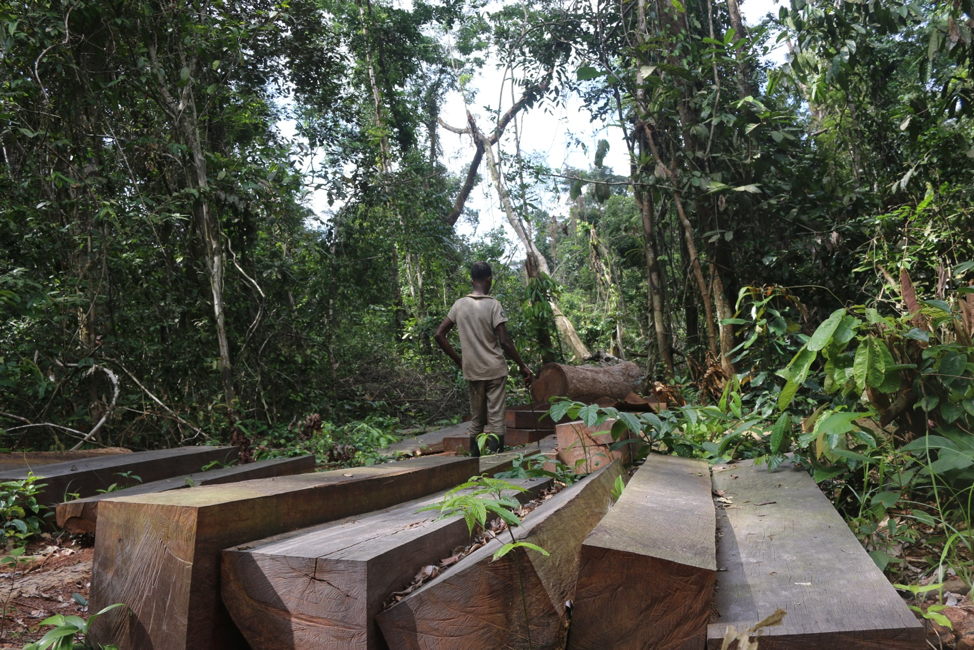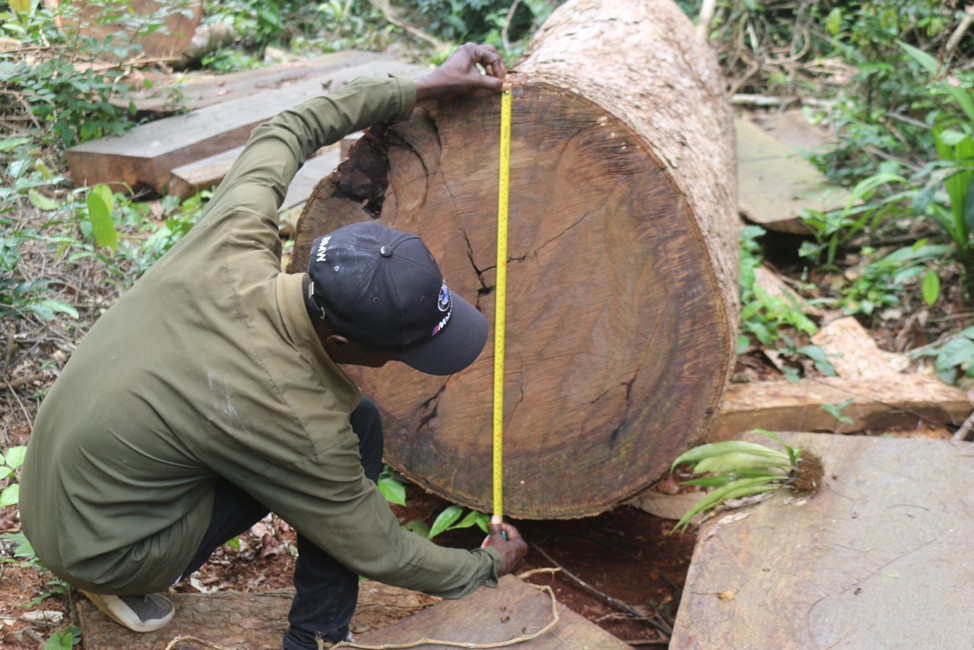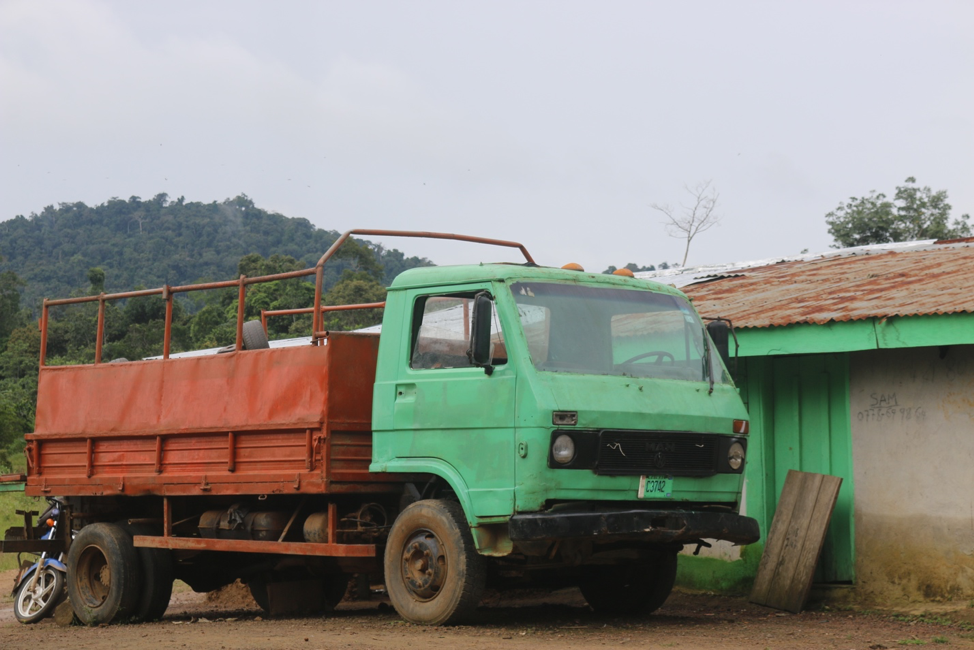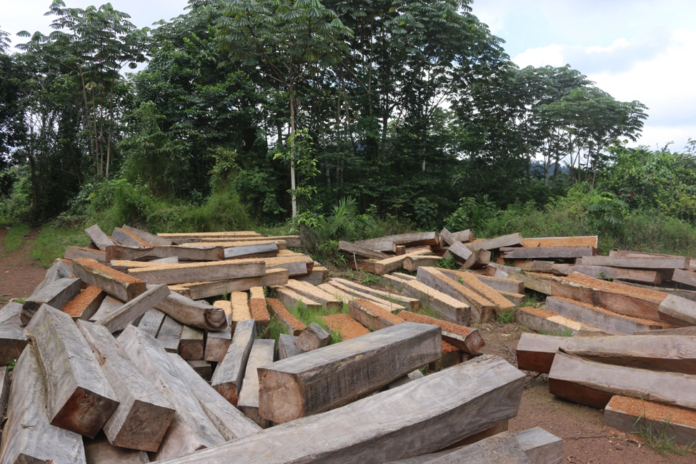Top: A pile of thick, square timbers, commonly called “Kpokolo” illegally harvested by Binta Bility. The DayLight/James Harding Giahyue
By James Harding Giahyue
Editor’s Note: This is the first of a two-part series, which exposes an illegal logging operation.
COMPOUND NUMBER ONE, Grand Bassa County – Two hundred and sixty pieces of thick, square timbers lay by a roadside in Zoegar Town, one of 18 sections in the Doe Clan. Twenty-five more are scattered in the forest.
The woods were harvested in two former logging concessions in Compound Number One, Grand Bassa. They are the products of an illegal logging operation being conducted by a businesswoman named Binta Bility, an investigation by The DayLight found.
“The pile of [timber]… is for one Binta Bility,” said Volygar Garblah, the Chief Elder of that region. Garblah said she had asked to harvest red hardwoods in two former concession areas and he and other chiefs worked out a payment scheme with her.
“Sometimes the sticks are from two or three sections in Doe Clan. When she went to Fubahn, the people charged her, from Kpelleh Town way they charged her also, and men were used to haul the timber from there,” Garblah said, adding Zoegar Town and Dumue Town were also involved in the illegal activities.
The operation she runs is commonly called “Kpokolo,” a new form of illegal logging across the country, which targets expensive hardwoods that are smuggled out of the country in containers. The woods are used for railroad tiles and bridges.
Bility denies any wrongdoing. But dozens of interviews with chiefs, elders motorcycle-taxi drivers, and the illicit loggers point to her.
Felling trees without a permit or from an illegal source is a grave offense in forestry. She faces a huge fine and a prison term if convicted by a court.
‘My Daughter’
Bility started working in the Compound Number One area in 2020 with planks but decided to switch to timber last year, according to Garblah. He said he had known Bility since she helped him pay for his medical bill some time ago.
“She is my daughter. She said, ‘Please give me a place to pack my logs, and after that, I will come for us to talk,’” Garblah told The DayLight. After our talk, then, I later talked with the section people.” He said they did not have a written agreement with her.

An orange and green 1996 MAN truck was parked at Gbarblah’s home with an improvised wheelbarrow, commonly called push-push in its trunk. Its license plate reads “C3742.”
“The car is for Binta but she left it with me,” Garblah said.
The forest where Bility operates was known in the logging industry as Timber Sale Contract Area Two and Timber Sale Contract Area Three. They were operated by Renaissance Group Incorporated and Akewa Group of Companies, respectively, before being canceled last year along with eight similar contracts following years of failure and illegitimacy.
Harrison Togbah, who identified himself as one of the forerunners of the illegal operation, said there were 17 workers, including some townsmen. He added that Bility gave the team pictures of the hardwoods to cut and that they had worked for six months.
“That’s the first consignment wasting outside there,” he said in reference to the woods on the road to Zoegar Town. “We made the arrangement that out of 200 pieces [of timber], she will be able to give me US$700.”
Togbah showed our reporters Bility’s mobile phone number he saved as “Boss Lady.” Togbah and Bility had communicated 36 times, according to Togbah’s call history. The number on his phone matched the one our reporters had used to contact her earlier on.
Massa Sawo, Togbah’s supervisor, confirmed she is their boss. Sawo declined to take further questions when quizzed on the illegality of their activities. “Ask Binta herself,” he said and hung up the phone.
‘Just Sample’
The people in Lolo Town showed they were as fond of Bility as those in Zoegar Town. A woman, who did not give her name, called Bility “my ma,” when our reporter showed her the picture Bility uses as her Facebook profile. Other residents, including Solomon Kpolon, an elder of Lolo Town, also identified Bility as the woman in the picture.
We visited the illegal logging site near the Worr River, a good distance from Lolo town. It was an old camp Bility had set up for her chainsaw milling operation, according to the townspeople we interviewed. There were an abandoned, makeshift warehouse still locked and an apartment camp house. Cassava, potato and pineapple thrived among the invading, wet bush. Leftover woods dotted the area. Twenty-six timbers measuring seven feet long and 10 inches wide are next to a felled tree.
“The kpokolo in the bush… are samples. [She asked us to do the sample so that] if someone she can bring the person here to see it,” said Stephen Bull, who said he headed the operation at that site and had known Bility since 2020. He even called out her number offhand.
Bull added that it took up to 15 men to place the woods in the push-push our reporters saw in the back of the truck at Garblah’s house. Thereafter, the vehicle takes the illegal timbers to the central location in Zoegar Town, according to Bull.
We found a phone number written with charcoal on the plank wall of the warehouse at the camp belonging to Kantee Zabeh. Zabeh, who said he was 20 years old, claimed to be Bility’s son in a phone interview. He gave her address as 21st Street, something Togbah had earlier told our reporters.

Garblah said the woods were meant to be exported. “Bility told me that the place she usually sells the timber is where the fighting is taking place in Europe, so this is why the woods have not gone yet and [are] still packing over there.”
By law, chainsaw milling is illegal but is permitted because the woods are supplied to the local market. The FDA has a system where fees are collected at various checkpoints, while it formulates a regulation for that kind of logging.
But kpokolo is illegal. Such timbers are exported outside of the official system that tracks woods from harvest to shipment, a crucial principle of Liberia’s forestry reform. Bility is not registered in that system known in the industry as LiberTrace, according to Gertrude Nyaley, the technical manager of FDA’s legality verification department (LVD). The DayLight had made a formal inquiry on the businesswoman’s status.
This investigation comes more than two weeks since leaked videos and pictures revealed similar operations run by an FDA ranger, who has now been suspended. The agency has alarmed over the smuggling of wood in containers, which it says makes it difficult to track down.
Bility denies she runs unlawful activities in Compound Number One. She challenged the fact the villagers revealed she was the mastermind of the illegal harvesting. “Stop disturbing my line but you are free to report whatever you [want] to,” she said in a WhatsApp chat. “I know I’m not doing any illegal logging.
“Good luck, dear,” she added.
“I just can’t stop laughing,” she said in another WhatsApp chat with several laughing emojis.

Bility still carries on with her operations. In our second round of interviews with Garblah, he told The DayLight she called him and asked whether he had spoken with us. A motorcycle-taxi driver, who did not want to be named for fear of reprisal, also said she dropped off a worker in the area on Sunday.
When told that Bility denies working in that part of the country, Bull gave a wry smile. “For her to deny that she is not working here is not right,” he said.
A person who does not hold a contract but harvests logs carries a fine for three times the value of species of timber at the prevailing price set by the FDA, according to the Regulation on Confiscated Logs, Timbers and Timber Products. The current price for ekki woods is US$210.

CORRECTION: This story deletes the word “legally” in the twelve paragraph for consistency.
Mark Newa, Emmanuel Sherman, Gerald Koinyeneh and an unnamed motorcyclist-taxi driver contributed to this report.
The story is a production of the Community of Forest and Environmental Journalists of Liberia (CoFEJ).

